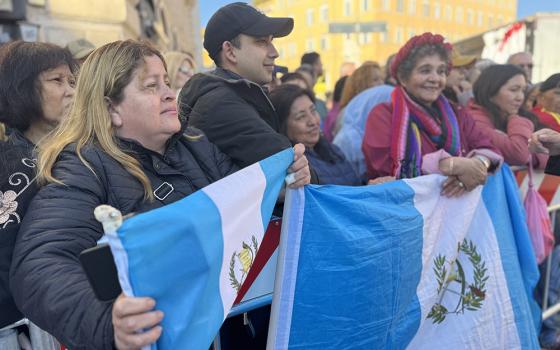A Honduran boy and his mother are seen prior to the start of the "Restore Protections for Holy Families: Prophetic Action to #SaveAsylum" demonstration in Nogales, Mexico, Sept. 25, 2021. (CNS photo/courtesy Ignatian Solidarity Network)
Bishops from Honduras and El Salvador and episcopal conference officials issued a statement Oct. 28 about their concerns over "what we are seeing on the borders of Central America, Mexico and the United States."
Joining in the statement were representatives of the Catholic Church in Guatemala and lay men and women who are ministering to migrants on the southern border of Mexico and the borders of the northern countries of Central America.
The statement was issued following the close of the VII Encuentro of Bishops Oct. 25 to 28 in Valle de Ángeles.
"We wish to express our shared concerns as well as proposals from the church, to ensure that migration is respected as a right and so that forced migration comes to an end," the group said.
"As countries of origin, transit, arrival and return, we are witness" to many factors driving migration, including "structural violence," corruption, poor economic conditions and insecurity as well as the effects of hurricanes and climate change, they said.
"Structural violence is forcing our Central American sisters and brothers every day to flee their countries, overwhelmed by economic conditions and insecurity," they said. "Widespread corruption and impunity are weakening the possibility of building a life in their home countries."
The governments of Central America and the United States, they said, "share responsibility for the political and economic policies which have contributed to the weakening of states. The impact of these policies weighs on those forced to flee in search of better conditions of life."
Advertisement
"Migration is a complex regional crisis which demands a rapid and integral response on the part of the governments, civil society, the church and others," they said.
They pointed to the COVID-19, "the sealing of borders" and the effects of recent hurricanes" as other reasons for migration, leading to increased numbers of "unaccompanied children, childbearing women and single families seeking to migrate."
"There has been no effective and integral response from governments to address the root causes of migration," they said. "Nor are they concerned about addressing the violation of norms for dignified return resulting from mass deportations."
"We demand migration policies from the governments of Central America, Mexico and the United States which respect human dignity, the international right to asylum, and which do not separate families," the church officials said.
They also said they oppose "the rapid removal of migrants through policies like the Biden and Harris administration's use of Title 42 and 'Remain in Mexico.'"
Title 42 is a provision of U.S. health policy enacted during the Trump administration that turns away certain immigrants at the border as part of public health measures to contain the coronavirus.
"Remain in Mexico" is another name for the Migrant Protection Protocols, or MPP, forcing certain asylum-seekers at the U.S.-Mexico border to wait in Mexico for their cases to be adjudicated.
Shortly after he was inaugurated, President Joe Biden suspended MPP, but his action was challenged in the courts and recently the U.S. Supreme Court ordered the Biden administration to resume the protocols, saying the way Biden rescinded the protocols was not legal.
Administration officials said they expected to reinstate the protocols in November, working with Mexico on the policy. But on Oct. 29, the administration announced that the U.S. Department of Homeland Security will issue a new memo to formally terminate MPP.
"We express once again our commitment to press the governments of the region, Mexico and the United States to address the root causes of migration," the group said.
"We renew our commitment and support for those persons who are migrating in our region," they continued, "even as we witness with anxiety, the response and treatment given by governments to those forced to flee, to migrants who face great challenges and great risks on their path, and to those who have been deported and are attempting to reintegrate.
Responding to the call of Pope Francis to work toward "an ever wider we," the group promised "to strengthen our regional work together to aid and walk with people who are migrating."
Attendees at the Valle de Ángeles gathering included a delegate of the Migrants and Refugees Section of the Vatican Dicastery for Promoting Integral Human Development. Archbishop John C. Wester of Santa Fe, New Mexico, and Bishop Mark J. Seitz of El Paso, Texas, were guests at the meeting.




